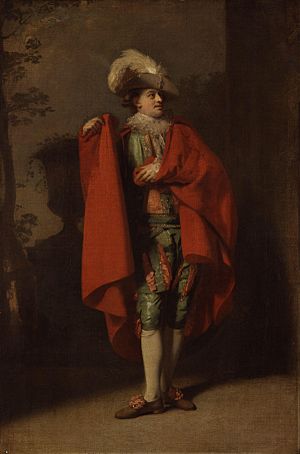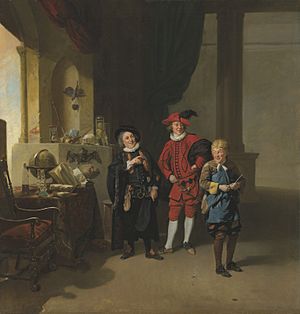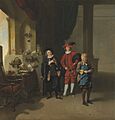John Palmer (actor) facts for kids
Quick facts for kids
John Palmer
|
|
|---|---|

John Palmer as Count Almaviva in The Spanish Barber, portrait by Henry Walton, 1779
|
|
| Born | c. 1742 London
|
| Died | 1798 (aged 55–56) Drury Lane, London, England
|
| Occupation | actor |
| Years active | c.1762-1798 |
John Palmer (around 1742–1798) was a famous actor in England during the 1700s. He was known for his amazing acting skills on stage. People often called him Plausible Jack because he was so good at making audiences believe his characters. There was another actor named John Palmer (1728–1768) who was called "Gentleman Palmer," but they were not related.
Contents
Early Life and First Steps on Stage
John Palmer was born in London around 1742. His father was a soldier who later worked at the Theatre Royal, Drury Lane in London. He was a bill-sticker (someone who put up posters) and a doorkeeper.
When John was about 18, he tried out for the famous actor David Garrick. John performed parts like George Barnwell and Mercutio. However, Garrick didn't think John had much talent for acting and suggested he join the army. John didn't listen and instead worked in a shop that sold prints.
John's first time on stage was on May 20, 1762. He played the character Buck in a play called Englishman in Paris. He performed this role a few more times for special "benefit" shows, which helped raise money for his father and others.
After this, John worked for another theatre manager, Samuel Foote. Foote thought John's serious acting was "bad" but believed his funny acting "might do." John then played Harry Scamper in Foote's play Oracle at the Haymarket Theatre.
Garrick still didn't want to hire John, so he joined a small acting group that traveled around the country. He performed in places like Sheffield. Eventually, Garrick hired him for Drury Lane Theatre, but only paid him a small amount. John kept working hard and slowly got bigger roles. In 1766, he finally got a better contract with Garrick for Drury Lane.
A Rising Star on Stage
John Palmer became very busy, performing many different roles. In 1767, he played Isaacos in a funny play called The Tailors. He also acted in The Beggar's Opera and other popular shows.
A big change happened in 1768 when "Gentleman Palmer" (the other John Palmer) passed away. This opened up more important roles for John Palmer. He became known for his ability to quickly learn parts, even difficult ones. For example, he once learned a role overnight that Garrick thought was impossible to master so quickly.
John's wife, Mrs. Palmer, also briefly acted on stage. She had lost money she expected to inherit because she married an actor, so Garrick kindly offered her a small acting job.
In 1772, John Palmer became very popular in Liverpool, especially for his serious acting roles. People loved him there. He was so good that he was chosen to play Joseph Surface in the very first performance of The School for Scandal in 1777. This role became one of his most famous. Joseph Surface was a character who pretended to be good but was secretly bad. John Palmer was perfect for this role because he had a way of charming the audience, even when his characters were doing something wrong. This is why he earned the nickname "Plausible Jack."
He was also excellent as Almaviva in The Spanish Barber. John Palmer and his wife had eight children.
The Royalty Theatre and Tough Times
In 1785, John Palmer decided to build his own theatre, the Royalty Theatre, in London. He faced many challenges because other big theatres, called "patent houses," didn't want new competition. They had special permission from the king to put on plays. John couldn't get a proper license, but he went ahead anyway.
He opened the Royalty Theatre on June 20, 1787, with a play called As You Like It. The theatre was very popular, but the other theatre managers fought against him. There were many arguments and even pamphlets (small books) written for and against his theatre.
Because of these problems and other money troubles, John Palmer ended up in debt. He even had to live in his dressing room at Drury Lane Theatre for a while to avoid being arrested for debt. Sometimes, he had to be secretly moved around in a cart behind theatre props! He even performed shows while he was technically a prisoner, earning money to pay off his debts. In 1789, he was briefly put in jail, but the public wanted him back on stage, so he was released.
Last Performance and Sad End
On August 2, 1798, John Palmer was performing in a play called The Stranger in Liverpool. He had been feeling very sad because his wife and favorite son had recently passed away.
During the play, in the fourth act, his character was asked about his children. John Palmer became very emotional. He tried to continue acting, but then he fell back, took a deep breath, and died right there on stage. The audience thought it was part of the play until his body was removed and the show was stopped.
After his death, special benefit performances were held in Liverpool and London to raise money for his children. These shows raised a lot of money to help them.
John Palmer is buried in the churchyard of Walton, Merseyside near Liverpool.
Famous Roles
John Palmer was a very talented and popular actor. He played a huge number of characters, mostly at Drury Lane Theatre. He was known for being very versatile, meaning he could play many different types of roles. He was especially good at funny characters and roles that required him to be a bit sneaky or charming.
Some of his most famous roles included:
- Welborn in A New Way to Pay Old Debts
- Face in The Alchemist
- Mercutio in Romeo and Juliet
- Iago in Othello
- Joseph Surface in The School for Scandal (one of his best!)
- Almaviva in Spanish Barber
- Dick Dowlas in The Heir at Law
- Young Wilding in The Liar (another one of his greatest)
- Captain Absolute in The Rivals
- Lord Foppington in The Relapse
- Falstaff in Merry Wives of Windsor and Henry IV, Part 1
- Henry VIII in Henry VIII
- Macbeth in Macbeth
- Shylock in The Merchant of Venice
- Father Philip in Castle Spectre
People said he was amazing at moving gracefully on stage. One writer said he was "the most unrivalled actor of modern times!" While he was great at many things, some critics felt he sometimes lacked a bit of refined taste in his acting.

Several paintings of John Palmer exist. One famous painting by Johann Zoffany shows him as Face in The Alchemist, alongside David Garrick.
Family and Other Actors Named Palmer
Brothers
John Palmer had two brothers who were also actors.
- Robert Palmer (1757–1805?) was John's younger brother. He was good at playing funny servants and country characters. He also took over some of John's famous roles after his death, like Joseph Surface.
- William Palmer died around 1797. He acted in operas in Dublin and also performed at Drury Lane.
"Gentleman" Palmer
There was another actor named John Palmer (1728–1768), who was known as "Gentleman Palmer." He was not related to the John Palmer this article is about. "Gentleman Palmer" was famous for roles like Captain Plume and Mercutio. He passed away in 1768 at the age of 40 due to accidentally taking the wrong medicine. He had two children, William Vaughan Palmer and Alicia Tindal Palmer, who later became a novelist.
Images for kids



